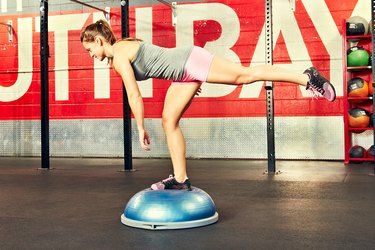
Want the best body you've ever had? OK, yeah. Silly question. But if you want something you've never had, you have to do some things you've never done. It's time to change up your boring old workout routine with a BOSU Balance Trainer.
Whether you're a beginner or an elite athlete, you can get a full-body workout with just this single piece of equipment. Here are 11 BOSU ball exercises for your next gym session.

So What's a BOSU Ball?
The BOSU Balance Trainer, often shortened to just BOSU ball, was invented in 2000 by David Weck as a more stable alternative to the traditional stability ball. BOSU, which stands for "both sides utilized," has a flat platform on one side and a squishy rubber hemisphere on the other, making it look a little bit like a stability ball cut in half.
You can switch which side is facing down depending on the exercise you're doing. Balance trainer workouts add an element of instability. The structure of the BOSU ball challenges your balance, forcing your body to recruit more muscles from your core in order to maintain stability. That ultimately means that every BOSU ball exercise is an ab exercise, not just crunches and sit-ups.
Benefits of a BOSU Balance Trainer
The BOSU Balance Trainer is a great tool to improve overall balance and stability. According to the Centers for Disease Control and Prevention, millions of people 65 and older fall each year and one of five falls results in serious injury, like broken bones or head injury. Per the recommendation of The National Academy of Sports Medicine, the muscle weaknesses that often lead to falling can be improved through balance training.
Balance is an essential component to everyday tasks and movements, says Dan Giordano, doctor of physical therapy and certified strength and conditioning specialist at Bespoke Treatments in New York City. However, balance begins to decrease as people age.
But regular balance training can improve balance in older adults, therefore decreasing the risk of fall and injury, according to a 2015 meta-analysis published in the Journal of Sports Medicine. For many trainers and physical therapists, this training includes the BOSU ball exercises.
Tips for Using a BOSU Balance Trainer
Because the balance trainer has inherent instability, it's important to exercise caution. Use your core to stabilize your entire body, and if you've never used a BOSU before, start slowly to get a feel for how these exercises compare with their body-weight counterparts before going full speed.
And if you're looking for hypertrophy, don't rely on the BOSU for massive muscle gains and don't use the BOSU ball with heavy lifting. Exercises like barbell squats, lunges, hip thrusts and deadlifts are sufficiently challenging without the added instability of the balance trainer. In that situation, you're better served focusing on perfecting your form and progressing your weight.
How to Do These Balance Trainer Exercises
If you're ready to add some balance elements, here are 11 BOSU ball exercises you'll want to incorporate into your current routine. Or go hard by using all these moves in one workout! Work up to doing each move for 45 seconds, keeping good form the entire time, and then resting for 15 seconds before moving on to the next.
For the single-side exercises (side planks, lunges, single-leg bridges, etc), be sure that you work both sides before starting the next exercise. Do all of these in row and you've got yourself a 17-minute, full-body workout.
1. BOSU Ball Push-Up

- Position the balance trainer with the hemisphere facing down, flat platform side facing up.
- With your wrists underneath your shoulders, place your hands on the outside rim of the platform in high plank position.
- Spread your feet about six inches apart to give yourself more stability.
- Engage your core, lower your chest down so that it touches the platform, and then drive back up to the start.
Read more: 24 Push-Up Variations for a Stronger Body
2. Side Forearm Plank
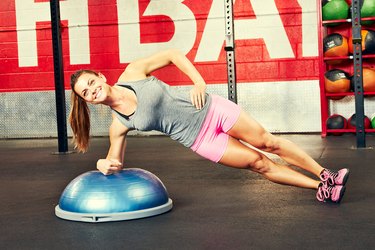
- Set the BOSU ball down with the flat side on the ground.
- Place one forearm on the BOSU ball and extend your legs out straight, feet stacked so that you're lying on your side. Your body should be in a straight line from head to hips to ankles.
- Tighten your core and lift up into a side bridge/plank.
- Pulse up and down at the top or hold statically.
3. Single-Leg Glute Bridge
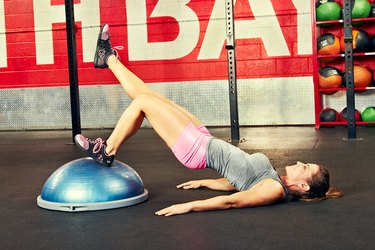
- With the flat side down, lie on your back and place one foot firmly on the BOSU balance trainer with your knee bent.
- The other leg should point straight out at a 45-degree angle and in line with the planted leg's thigh.
- Squeeze your glutes and thrust your hips up to the sky. Keep your core engaged and your hips level throughout.
- Hold for a second, and then slowly lower back down.
Read more**:** 8 Unilateral Exercises to Challenge Your Balance
4. Mountain Climber

- Place the BOSU ball down, flat side facing up.
- Start in the push-up position on top of the flat platform with your hands underneath your shoulders and your feet behind you.
- Keeping your hands in place, body in line, drive one knee up toward your chest, and then bring it back down to meet the other one.
- Quickly alternate with the other side and continue alternating.
5. Front Lunge
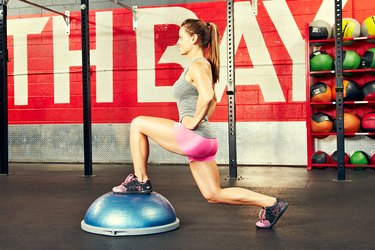
- Position the BOSU ball hemisphere side up.
- Stand behind the balance trainer and step onto it with one foot. This will feel funny because the BOSU will give way a bit.
- Slowly lower down into a lunge, keeping your front knee behind your front toes.
- Push through your front leg and drive off the BOSU to stand back up and repeat on the other side.
6. Single-Leg Romanian Deadlift

- Place the BOSU with the platform side down. Stand on the BOSU on one leg with a slight bend in the knee.
- Hinge at the hip and extend your free leg behind you for balance.
- Lower your upper body until it's parallel to the ground or as far as you can go while still maintaining a flat back.
- Then return to the upright position slowly, with control.
- Keep your hips in a steady position without letting them rotate to one side.
- For some more burn, hold a dumbbell or kettlebell in the opposite hand of the standing leg.
Read more**:** The Top 15 Moves to Tone Your Glutes
7. Single-Leg Plank
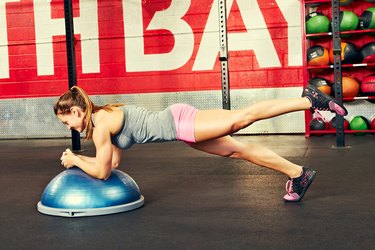
- Place the flat platform on the floor and place your forearms on top of the BOSU ball.
- Step your legs back into a plank position.
- Lift one leg off the ground and hold. Your core and glutes should be tight to avoid your stomach or hips sagging.
8. BOSU Ball Burpee
- Stand holding the BOSU balance trainer in your hands with the flat side facing your body.
- Hinge at the hips and slightly bend your knees as you place the BOSU on the ground.
- Making sure that your hands are secure, jump back into a push-up.
- Perform a full push-up (or skip for an easier variation).
- Keep your core tight and jump your feet back to the BOSU ball and stand up.
- Raise the BOSU up to the sky, then repeat.
Read more**:** 15 Burpee Variations That Will Kick Your Butt
9. BOSU Ball Squat
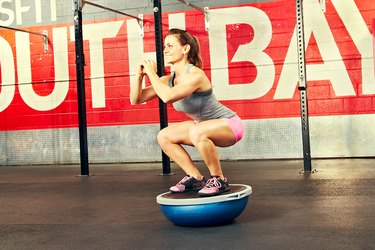
- For the advanced BOSU baller, place the ball side down, flat platform facing up.
- Carefully step onto the platform one leg at a time, letting the ball sink.
- Use a hand on the ground (or partner) for stability as needed.
- Come to standing and once you're comfortable, slowly hinge at the hips and send your butt back into a squat.
- Keep your knees over the middle of your shoe and drive through your heels as you stand up.
Tip
To modify, get into your low squat position and hold, then step carefully off the balance trainer, rather than squatting up and down.
10. Lateral Lunge
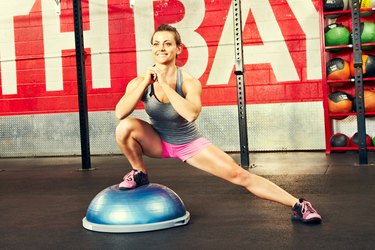
- Stand with your feet hips distance, BOSU ball hemisphere side up next to you.
- Step to the side and place one foot on the balance trainer, the other foot remains stable on the ground. Feet should be parallel to one another.
- Send your butt back as you descend into a side lunge with all of your weight on your lunging leg.
- Squeeze the glutes and drive back up to return to standing.
11. Side Hop
- Add some fire to the lateral lunge by alternating legs with a hop.
- Instead of returning back to standing after each rep, after completing a side lunge, explode off of the BOSU ball and switch feet in the air.
- Return to a side lunge, but on the opposite side.
- Continue alternating sides.